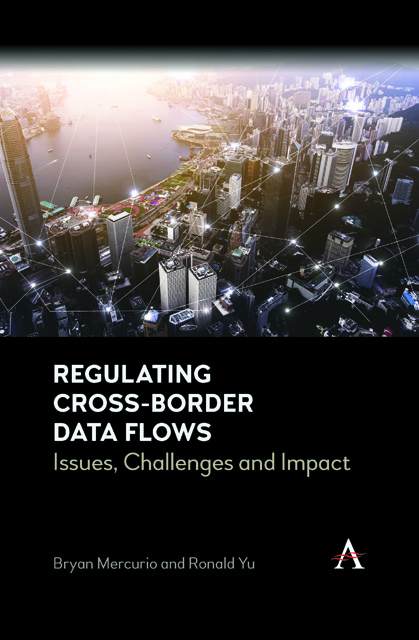2 - Key Considerations
Published online by Cambridge University Press: 22 November 2022
Summary
Formulating a policy on cross-border data flows is challenging for several interconnected reasons. The increasing number of devices connecting on the IoT is creating a staggering amount of data, and with every successive product iteration, each device can generate more data. Increased levels of connections breed innovation – for example, data sent across borders by these devices can be mined for valuable customer insights that can, in turn, not only lead to new services or products but could also be combined with other data in innovative applications that had not even been conceived just a few years earlier. And, of course, cross-border communications enable interactions that might result in yet more innovation.
Global interconnections can also breed complexities, and legal, ethical, societal and cultural issues come into play when data crosses borders and standards are not harmonized. Some countries, such as the United States, advocate almost total free data movement with regulation only to the extent necessary. Others, such as China, adopt a model of central control, and companies wanting to do business in China must adhere to their data rules, whether this means restricting certain data from leaving the borders, locating infrastructure within the country or even dictating corporate behaviour (such as prompting companies to suspend plans to list on stock exchanges for fear of infringing ever-changing rules of what data can or cannot leave a country ’s borders) (Gao, 2018; Lim, 2021).
Before a jurisdiction can successfully formulate a policy on data and data flows, it needs to be able to navigate the landmine of converging and crisscrossing objectives. To do so, officials must understand the nature of modern data, what makes data valuable and what makes its management so tricky: that a solid technological infrastructure is important is obvious, that subtle changes in the law may produce unexpected results may not be obvious.
Before delving into the different models of data governance (in Chapter 3) and evaluating frameworks for managing cross-border data (in Chapters 4 and 5), we first need to explain what makes data different from other types of assets and why the sharing of data is so important in the modern global economy.
- Type
- Chapter
- Information
- Regulating Cross-Border Data FlowsIssues, Challenges and Impact, pp. 9 - 18Publisher: Anthem PressPrint publication year: 2022



